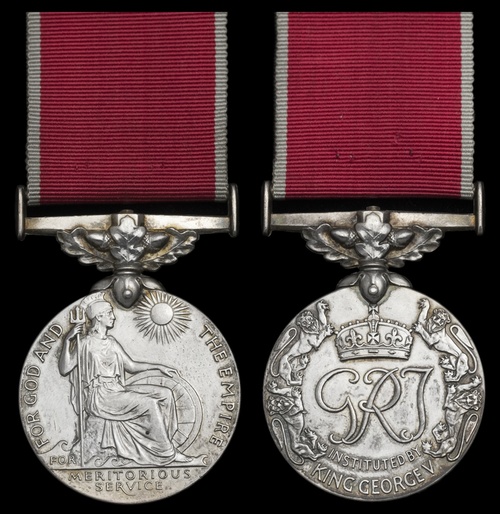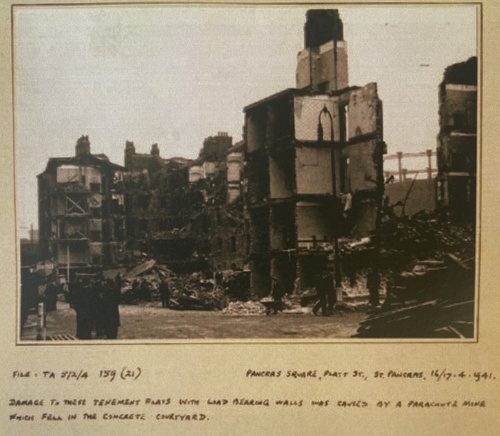Auction: 25001 - Orders, Decorations and Medals
Lot: 370
The 'St. Pancras bombing 1941' B.E.M. awarded to Constable H. J. Smith, Police War Reserve, 'N' Division, Metropolitan Police who, whilst off duty, saw a women trapped in her home by a parachute mine
Finding a ladder he climbed the crumbling, bomb damaged building, dug her free and pulled her to safety, all while the bombs continued around him, his original recommendation was for the George Medal, later downgraded
British Empire Medal, Civil Division, G.VI.R. (Henry John Smith), officially engraved naming on a pre-prepared background, light edge wear, very fine
B.E.M. London Gazette 12 September 1941, the original citation states:
'A bomb damaged a building, the remains of which were liable to collapse. War Reserve Constable Smith obtained a ladder, climbed to the top of it and then hauled himself on to a balcony which went round to the first floor. He climbed through a window and entered a room where he found a woman buried up to the neck in rubble. He began to dig with his hands although debris was falling and further bombs were dropped in the neighbourhood. Smith eventually released the victim and carried her to safety.'
Henry John Smith worked as a packer in civilian life and was living at 41 Goldington Buildings, St. Pancras during the Second World War. He volunteered for the Police War Reserve and was posted to 'N' Division, Metropolitan Police. The original recommendation for his award was for the George Medal however it was downgraded to the B.E.M., the text goes into further detail on the events of 17 April 1941:
'On 17th April 1941 at about 3.15 a.m. a parachute mine fell in Pancras Square, Platt Street, N.W.1., causing widespread devastation to the surrounding property including a very large block of flats and the "Star" P.H. at the corner of Platt Street and Goldington Street.
War Reserve Smith, who was off duty but lived in the vicinity had returned from assisting at another incident at St. Pancras Hospital when he saw a parachute mine descending in the vicinity of Somers Town Police Station. He immediately went towards Pancras Square and while on his way the mine exploded. On arriving at the scene he rendered assistance, in the course of which he rescued a pregnant woman, and then heard cries for help coming from the first floor of the public house.
This building appeared to be in imminent danger of collapse and part of it had to be pulled down next day, but War Reserve obtained a ladder (which was too short) climbed to the top of it and then hauled himself on to a balcony which went round the first floor. He climbed through a window and entered a room where he found a woman buried up to the neck in rubble and debris. He began to extricate the woman with his hands although pieces of ceilings and brickwork were falling and further bombs were still coming down in the neighbourhood.
The woman was eventually released and carried to the window. War Reserve Smith then shouted to another police officer to fetch a longer ladder and when this arrived he put the woman over his shoulder and descended to the ground. She had by this time fainted.
With the assistance of the woman's brother-in-law he took her to a Rest Centre and then returned to the scene of the incident and rendered what further assistance he could until 5.15 a.m. when he returned home, cleaned himself and reported for duty at 5.45 a.m. at Somers Town Police Station.
Although War Reserve Smith was due to parade for duty at 5.45 a.m. the same morning he voluntarily rendered assistance at various incidents during the night. He attended a major incident at St. Pancras Hospital and then generally assisted at Pancras Square, in the course of which he rescued the two women. It is likely that had it not been for the efforts of this War Reserve the second women would have been buried by debris.
The conduct of War Reserve Smith, who was off duty, was meritorious and his conduct was of a very high order.
The acting Superintendent of the Division recommends War Reserve Smith for an award or mention in the London Gazette. The Deputy Assistant Commissioner of the District considers his conduct worthy of high award and recommends the award of the George Medal.'
Whilst impressive this recommendation does little to underline the danger of the situation and can be better outlined by the testimony of the witnesses, firstly the victim of the bomb, Mrs. Constance E Keevil, who states:
'My house partially collapsed, and as I attempted to leave my office the door collapsed on me, pinning me in the corner with the door, by this time the ceiling and walls were collapsing on me, burying me in the debris up to my shoulders. I was completely helpless, and shouted for help; this was answered by a man's voice, telling me to wait; shortly afterwards a policeman entered my office through the balcony window, he started to clear the debris off me with his hands, repeatedly telling me to keep calm. All the time he was doing this masonry was falling in patches and was dangerous to us both. He eventually cleared me of the debris, took me to the window and shouted for someone to bring a longer ladder, still doing his best to keep me calm, which I might say was a great effort on his part. The raid was still very heavy; the next I remember was being thrown over the P.C.'s shoulder and carried down the ladder when I completely collapsed.'
P.C. Richardson adds his verdict:
'The air raid was still in progress and of a severe character; the public house was in a very bad condition and liable to collapse further.
In my opinion The War Reserve acted with great promptitude and courage, and at great personal danger considering all the circumstances of the night.'
Sold together with copied research.
Subject to 20% VAT on Buyer’s Premium. For more information please view Terms and Conditions for Buyers.
Estimate
£600 to £800
Starting price
£480







